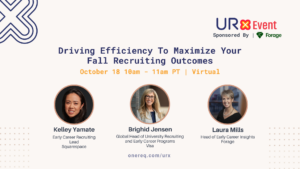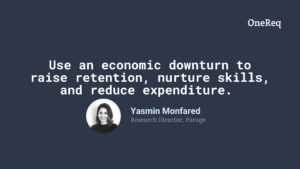BY: Yasmin Monfared
We all know about the growing global skills gap – including early talent. And when existing frameworks aren’t providing an adequate solution that can foster the supply of skilled talent we need, employers need to innovate. How? By adopting a train-then-hire model.
Of 2,000 global survey participants 14% believe college provides the skills needed for workplace success and 98% want more practical training.
It’s hard to avoid discussions about the growing skills gap when it comes to early talent recruiting. It’s a major concern for CEOs around the world and it’s leaving talent teams grappling with a war for skilled talent unlike any before.
Early talent also know about the skills gap. In fact, Forage’s recent study across nearly 10,000 global participants, ‘The Great Disconnect’, found that when it came to successfully pursuing a career, gaining relevant technical skills was consistently the primary concern. Another Forage study across nearly 2,000 global participants found that only 14% believe college provides the skills needed for workplace success and 98% want more practical training. They recognize how hyper-specialized the working world has become and how critical relevant technical skills are to career success. They also recognize that college can’t fully serve their needs.
The issue is that early talent is limited in what they can reasonably do about it.
Why existing solutions don’t work
Academic institutions like colleges and universities work to provide the theoretical foundation, but as intermediaries, they cannot substitute for industry knowledge – nor should they be expected to. Yet we continue to rely on them as the primary conduit towards workplace readiness.
Notably, students not only rely on them to gain skills, they also rely on them for career awareness. ‘The Great Disconnect’ study found that nearly 60% of students will heavily rely on the career advice given from faculty or staff at their college or university, but the educators themselves actually tend to avoid providing such advice given their distance from that specific industry or workplace. In fact, they wish that employers and students would reduce their reliance on career centers and engage more directly with one another.
Outside of actually securing full-time employment, students struggle to access opportunities to not only gain workplace-relevant skills but genuinely understand the nuances of different workplaces. The only traditional option available is internships.
Internships play a critical role in bridging the skills and career awareness gap. NACE’s 2021 Student Survey Report found 85.7% of interns were provided with the chance to learn a lot about the field, profession, or business, while 86% found their internship taught them things they would not have been able to learn in a classroom.
But the inherently constrained scale of any internship program means employers must be selective, and therefore many applicants are left behind. NACE found only 50.5% of graduating seniors had engaged in an internship.
Internships also function as the first point of attrition because they are often a student’s first foray into the industry they study. The same NACE study found only 57.4% of interns actually wanted to continue working with an organization once they finished their internship. This means an employer invests precious time and resources to skill a finite supply of early talent – and just under half of which goes off elsewhere.
Building supply to solve the skills gap
When faced with a growing demand for skilled talent but navigating an education-to-workforce pathway that does not build the necessary supply of skilled and career aware candidates, what can employers do?
Industry leaders are already moving to resolve skill gaps by alternative means. Over the past five years, IBM has partnered with community colleges to build curriculums for in-demand IT skills such as cloud computing and data science. We’ve also seen dozens of career-centered digital certification programs cropping up in recent years from the likes of HubSpot, Google, and Meta, competing with traditional academic pathways.
Some industry leaders have taken it a step further and found a way to create scalable and open-access skill-building opportunities that directly reflect their workplace. A software engineer at Google is not the same as a software engineer at Walmart or JPMorgan, and only those companies can show candidates the difference.
So, how do employers like Cognizant, Mastercard, BCG, and GE take this further step without creating even more work for their talent teams? They use virtual job simulations.
Virtual job simulations let employers bring their workplaces to life. The work isn’t real, but it feels real – and it enables employers to showcase what they do, how they do it, and what makes them unique. The virtual and open-access aspect of these simulations mean that there is infinite scalability. Anyone anywhere – regardless of their socioeconomic status – is given the opportunity to spend approximately 6 to 8 hours to complete a day-in-the-life simulation that enables them to not only experience a specific role at a particular employer, but also gain workplace-specific skills.
Academic institutions are also seeing the importance of virtual job simulations. In just over 18 months, over 400 colleges and universities around the world are either distributing them to their students or integrating them directly into their coursework. And the impact on students is real – a platform-wide analysis across over 50 virtual job simulations found:
- 88% gained new skills
- 99% felt more confident applying for a role
- 66% changed their mind about a particular career path.
By front-loading opportunities to gain workplace-specific skills, employers benefit from a larger supply of talent that have the skills to hit the ground running from day one.
If you want to learn more about virtual job simulations or the train-then-hire model, contact one of our early talent consultants here.
About the Author
Yasmin Monfared is Forage’s Research Director. She is responsible for leading and collating research and insights across Forage’s student, educator, and employer community to help recruiters enhance and evolve their talent strategies.




